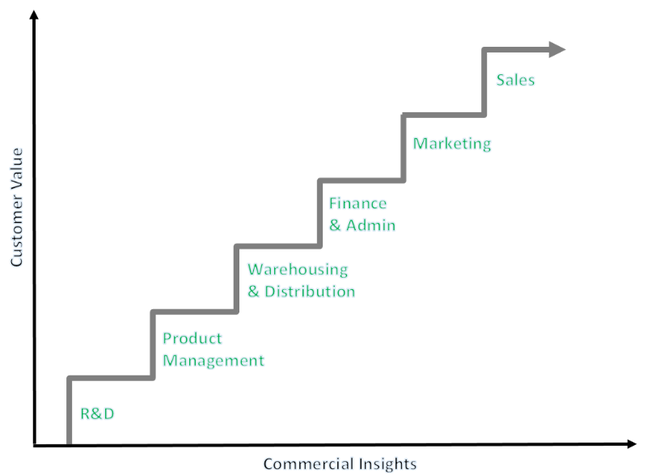Sellers need to be business improvement specialists!
A couple of months ago I posted an article extolling the virtues of Team-Based Selling – and some of the facts that are now driving vendor businesses to rethink their sales activities around collaboration. Mature markets and the new buying journey are now forcing vendor businesses to leverage their entire organisational resource pool in order to extract every last piece of value that can be delivered to their customers. Simply relying on individual sales people, acting as an autonomous agent within his/her territory, to gather and present the best pitch possible to each and every customer is no longer good enough to win. That’s just throwing mud at the wall in the hope that some of it sticks.
The truly successful sales teams of today and tomorrow are now collaborating with their colleagues across all business functions to extract and create the highest level of value-add that their businesses can offer in the hope of creating competitive advantage. Corporate Executive Board (CEB) is the world’s leading authority in the new era of Challenger sales and they refer to this process of finding 'value-add' as “commercial insights”. That is, insights that actually add commercial value to the customers business. Sales people must now bring with them unique, relevant, meaningful and applicable knowledge/insights that actually creates value for their customer’s business and the specific problems that they are trying to solve, and it’s the customer’s perception of your insights that matters…not yours. Of course, there is no point just sprouting useless statistics at your customers if they can get those same stats from the next sales person that waltz’s through the doors.
How to gather "commercial insights":
CEB’s Brent Adamson & Mathew Dixon (et al, 2015) have written a highly insightful chapter on how vendor sales teams should go about “building commercial insights” in their best-selling book - The Challenger Customer (2015). In this book, CEB lays out some examples of what it takes to understand a customer’s “mental model”(preconceived views) and their “high order concerns” and then how sales vendors can go about “re-framing” and mapping new "commercial insights" that create the all important value for the customer, that also positions the sales person as a 'trusted adviser'. Whilst some of this sounds simple enough, it's my opinion that vendor sales teams must start with some basics:
1) Engage All Functional Units:
There are always smart people in the non-sales departments whose insights (and contacts) can be leveraged. Why don’t we utilise ALL of these people to help with sales? Fresh sets of eyes and ears nearly always brings innovative thinking and these underutilised colleagues are nearly always a valuable source of knowledge. There’s nothing wrong with realigning the culture to one of sales centricity. I will argue that being sales centric' is the same as ‘customer centricity’ because being sales centric is about identifying, creating and communicating value to your customers so that they win in the first instance - and you win as a by-product.
The value ladder diagram below is a simple illustration that depicts the incremental gains that can be achieved (for customers) when sales people actually collaborate across the ENTIRE business, leveraging all knowledge and expertise in every functional area. Incremental ‘commercial insights’ that all add up value for customers.

Imagine a sale planning off-site day, or company brainstorming session, that actually included every single person in the company, and that focused on forensically examining every tiny insight or data point that might actually help increase the value that your sales people can offer your clients. Then imagine, the untapped insights that likely exist within your suppliers and channel partners (up & downstream).
- Create an internal Task Force to include cross functional team members allowing cross-pollination of ideas and knowledge.
- Launch an internal Competition – a battle of ideas to come up with some brand new 'commercial insights'. Winning department gets a prize.
- Create an industry Think Tank to include partners/suppliers that will generate evidence-based 'commercial insights' that customers will value.
- Outsource or engage a specialist 3rd party that can assist in facilitating the development of 'commercial insights'.
Chances are that there are insights just sitting there waiting for a smart sales leaders to uncover them, and regardless of how you approach this, you must ‘tap’ your entire corporate knowledge-base, and in some cases the adjoining organisations from your business ecosystem.
Insights from Data:
The Nobel Prize–winning physicist Murray Gell-Mann once said that he thought the “most valued personal trait in the twenty-first century would be a facility for synthesizing information”, and herein lies the rub for sales vendors: all businesses nowadays are flailing about in the on-going attempt to manage more and more data than they can actually handle.
Research shows that 96% of this data is never used beyond its creation, and this is due to the fact that only around 20% of this data is considered to be ‘structured data’ – log files, spreadsheets, tables etc. Up to 80% of data is ‘unstructured’ such as call notes, meeting minutes, emails, documents and stored in data silos such as CRMs & ITSM systems. This unstructured data is much harder to manage and to convert into information – intelligence - knowledge and ultimately the “commercial insights” that are needed. Whilst there are now vast numbers of businesses springing up that claim to be able to assist with this challenge of managing data, before you rush out and engage a 3rd party specialist to help you build your data (knowledge) management capabilities, you first need to put the foundations down that will facilitate team-based selling and IMHO, this begins with the recommendations outlined above.
Conclusion:
I know that this might sound controversial, but if you are sales leader, why not try dropping ALL of those internal activities that make no impact on deal progress, and refocus your sales people on a team goal of identifying 3 x “commercial insights”. I’ll guarantee that this activity will pay dividends for your customers (and therefore your business sustainability) and it might also get your sales teams collaborating with their colleagues the way that they will need to moving forwards. Oh, and make sure that your sales people ALL read “The Challenger Customer” by CEB.


